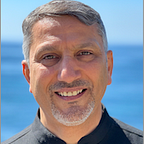Why Muslims are Voting for Bernie Sanders
By Hatem Bazian and Khaled A. Beydoun
The 2016 presidential race comes at a critical impasse for Muslims in California. At an estimated 1 to 1.5 million, California is home to the largest population of Muslims in the United States. The state has more than 250 mosques, and boasts concentrated Muslim communities in Anaheim, the Bay Area, and beyond.
While Michigan and New York are popularly perceived to be centers of Muslim American life, California is — by a far stretch — the demographic hub for Muslims living in America.
The hateful rhetoric of Republican candidates, most notably Donald Trump, has put Muslim voters in California on guard. Indeed, Muslims voters rightly fear the imminence of “Muslim immigration bans” if the presumptive Republican nominee is elected, which explains their intensive voter registration and mobilization for the upcoming California primary. In addition to immigration and travel bans, Muslims feel vulnerable to the expanded surveillance and religious profiling ushered in under the Obama administration. Islamophobia, in the form of political rhetoric and state policy, is rising at a dangerous clip.
In the upcoming June 7th California primary, Muslim voters in the Golden State are consciously supporting Bernie Sanders, the one candidate that has explicitly and consistently condemned Islamophobia and bigotry. Sanders vehement opposition to Islamophobia is far more than merely political posturing against the man who built much of his campaign upon it; nor pandering to a voting bloc that helped deliver the “Michigan miracle” to the Sanders campaign in March. But rather, a position consistent with a track record of siding with broad Muslim American interests, and against the “War on Terror” policies that curtail Muslim American civil liberties.
Muslims are informed voters and cast their ballot based on issues. Fifteen years before his condemnation of Islamophobia, Sanders voted against the US PATRIOT ACT. The unprecedented legislation that enabled sweeping surveillance of Muslim American households, places of worship and communities. Rooted in the very same baseline that conflates Muslim identity with suspicion of terrorism, prevailing Islamophobia follows in the footsteps of the PATRIOT ACT, and in turn, assigns Muslim Americans with the collective guilt that enables collective injury.
Sanders, unlike Hillary Clinton, stood firmly against the PATRIOT ACT. And today, stands against Islamophobia while his Democratic Party competitor perpetuates “clash of civilizations” rhetoric that foreshadows a commitment to carry forward racial and religious profiling programs. Programs that were piloted in the metropolitan Los Angeles area in 2014, where the mission to counter-radicalization has severely curtailed the free exercise of religion and speech rights of Southern California’s sizable Muslim community.
Sanders’ championing of economic equality also resonates deeply with a sizable segment of California’s Muslims, particularly Muslim households in California living below, at or dangerously close to the legal poverty line.
Muslim Professors Zareena Grewal and Donna Auston observed, “While they are stereotyped as a wealthy and upwardly mobile demographic, a recent Pew Study found that 45 percent of Muslim Americans earn a household income just above the poverty line — making them a natural base group for Sanders. Sanders’ economic policies illustrate that his social welfare programming and tax schemes would instantly advance the interests of nearly half of the Muslim American population.”
With regard to foreign policy, Bernie Sanders is the far better candidate for Muslim Americans. Sanders vehemently stood against the War in Iraq, voting against it while Hillary Clinton favored it. In addition, Sanders brings an evenhanded and progressive stance on the Palestinian-Israeli conflict. During April’s Democratic Debate in New York City, Sanders stated:
“In the long run, if we are ever going to bring peace to that region, which has seen so much hatred, and so much war, we are going to have to treat the Palestinian people with respect and dignity… I believe the United States and the rest of the world have got to work together to help the Palestinian people.”
While unprecedented, these words reflect Sanders’ humanitarian outlook, and outreach efforts to include Palestinian American leaders in his campaign, most notably Linda Sarsour and Amer Zahr, who serves as campaign surrogates.
This inclusion also extends more broadly to Muslim Americans. Rusha Latif, a lead volunteer for the Sanders campaign in California, observes, “Bernie has gone out of his way to include and engage Muslims at every level of his campaign — as surrogates, speakers at his events and rallies, and field organizers. He’s repeatedly blasted Republican candidates for their Islamophobia and stood up for us. If we really appreciate what he’s done for our community, it’s time for us to show up for him like he’s been showing up for us.”
Whether domestic or foreign policy, positions linked to surveillance on Muslim Americans or economic programs that empower working and middle class Muslim households, Bernie Sanders is not only the better option. But the far better option this June 7 for Muslim Californians.
With so much at stake for Muslims in California, and the country at large, we are asking community members to cast their votes this coming Tuesday for Bernie Sanders.
Khaled Beydoun, Professor of Law at the University of Detroit Mercy, helped mobilize the Muslim American vote in Michigan critical to Sanders’ upset in the state.
